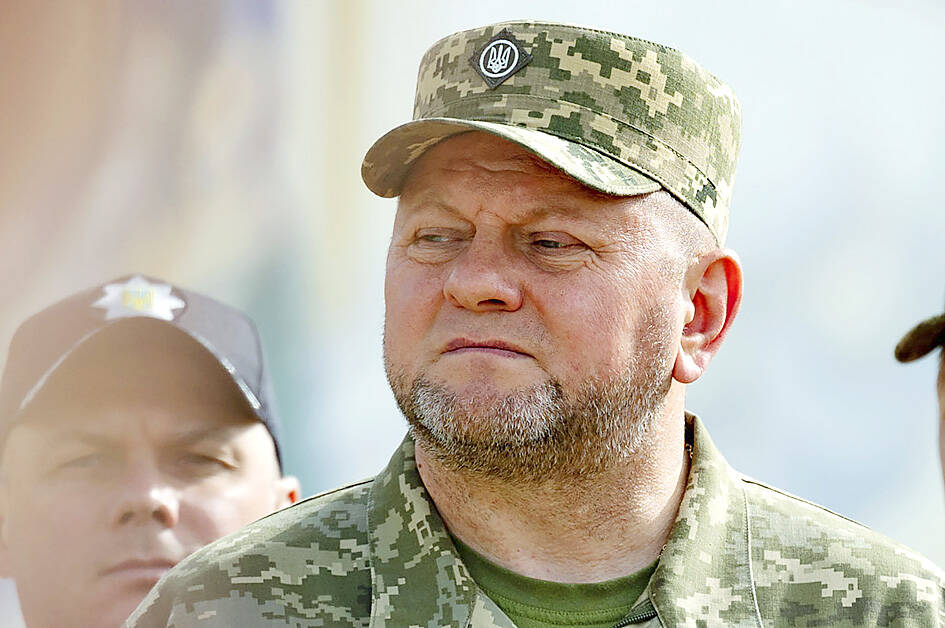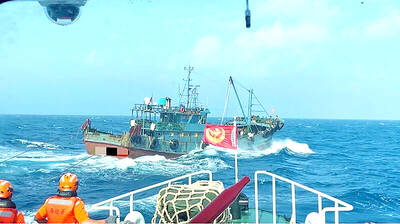The leaders of the 27 EU countries yesterday sealed a deal to provide Ukraine with a new 50 billion euro (US$54 billion) support package, despite Hungary’s weeks of threats to veto the move, while separately Ukrainian commander-in-chief Valery Zaluzhny refused to step down from his post at a meeting with Ukranian President Volodymyr Zelenskiy on Monday, people familiar with the discussions said.
European Council President Charles Michel announced the agreement about an hour into the leaders’ summit in Brussels.
“We have a deal,” Michel wrote on X.

Photo: Ukrainian Presidential Press Office via AP
He said the agreement “locks in steadfast, long-term, predictable funding for Ukraine,” and demonstrated that the “EU is taking leadership and responsibility in support for Ukraine; we know what is at stake.”
It was not immediately clear if any concessions were made to secure Hungarian Prime Minister Viktor Orban’s approval. He raised objections to the financial aid package in December last year and in the days leading up to yesterday’s summit in Brussels.
On their way into their meeting, several leaders had lashed out at Orban, accusing him of blackmail and playing political games that undermined support for Ukraine.
“There is no problem with the so-called Ukraine fatigue issue. We have Orban fatigue now in Brussels,” Polish Prime Minister Donald Tusk told reporters. “I can’t understand. I can’t accept this very strange and very egoistic game of Viktor Orban.”
In December, the 26 other leaders agreed on an aid package worth 50 billion euros for this year through 2027. They also agreed to make Ukraine a candidate for EU membership.
However, the financial package was part of a review of the EU’s continuing seven-year budget, which requires unanimous approval.
In other news, Zelenskiy asked Zaluzhnyi to take on a new role as he seeks to reinvigorate his military leadership following the failure of the Ukrainian counteroffensive against Russia’s occupying forces since the fall, which Zaluzhnyi refused. The move also reflects a deepening power struggle at the heart of the country’s war effort.
Zelenskiy’s spokesman said that Zaluzhnyi has not been pushed out.
Rumors of tensions between Zelenskiy and his top commander have been swirling around Kyiv for months, fueled by an outspoken interview that Zaluzhnyi published in The Economist in November last year.
Zaluzhnyi said the war had reached a stalemate, a view that was publicly contradicted by his boss.
Disagreements between Zelenskiy and Zaluzhnyi actually date back to the first months of the war, people familiar with the military leadership said.
Zelenskiy is pushing for a bolder approach to the conflict this year and has appeared at odds with his general’s more conservative approach.
The two men have also sparred over a new law on conscription that aims to replenish the depleted ranks of the army, but is unpopular with the Ukrainian people.
The tensions have been exacerbated by that Zaluzhnyi is wildly popular with both the Ukrainian people and his troops. The general, who has the backing of 88 percent of Ukrainians in polls, has said he is not interested in becoming a politician, while Zelenskiy has also warned top military officials against entering politics.

MILITARY BOOST: The procurement was planned after Washington recommended that Taiwan increase its stock of air defense missiles, a defense official said yesterday Taiwan is planning to order an additional four PAC-3 MSE systems and up to 500 missiles in response to an increasing number of missile sites on China’s east coast, a defense official said yesterday. The official, who spoke on condition of anonymity, said that the proposed order would be placed using the defense procurement special budget, adding that about NT$1 trillion (US$32,88 billion) has been allocated for the budget. The proposed acquisition would include launchers, missiles, and a lower tier air and missile defense radar system, they said The procurement was planned after the US military recommended that Taiwan increase

POLITICAL AGENDA: Beijing’s cross-strait Mid-Autumn Festival events are part of a ‘cultural united front’ aimed at promoting unification with Taiwan, academics said Local authorities in China have been inviting Taiwanese to participate in cross-strait Mid-Autumn Festival celebrations centered around ideals of “family and nation,” a move Taiwanese academics said politicizes the holiday to promote the idea of “one family” across the Taiwan Strait. Sources said that China’s Fujian Provincial Government is organizing about 20 cross-strait-themed events in cities including Quanzhou, Nanping, Sanming and Zhangzhou. In Zhangzhou, a festival scheduled for Wednesday is to showcase Minnan-language songs and budaixi (布袋戲) glove puppetry to highlight cultural similarities between Taiwan and the region. Elsewhere, Jiangsu Province is hosting more than 10 similar celebrations in Taizhou, Changzhou, Suzhou,

COGNITIVE WARFARE: Chinese fishing boats transmitting fake identification signals are meant to test Taiwan’s responses to different kinds of perceived incursions, a report said Chinese vessels are transmitting fake signals in Taiwan’s waters as a form of cognitive warfare, testing Taipei’s responses to various types of incursions, a report by the Institute for the Study of War said on Friday. Several Chinese fishing vessels transmitted fake automatic identification system (AIS) signals in Taiwan’s waters last month, with one mimicking a Russian warship and another impersonating a Chinese law enforcement vessel, the report said. Citing data from Starboard Maritime Intelligence, the report said that throughout August and last month, the Chinese fishing boat Minshiyu 06718 (閩獅漁06718) sailed through the Taiwan Strait while intermittently transmitting its own AIS

CHINESE INFILTRATION: Medical logistics is a lifeline during wartime and the reported CCP links of a major logistics company present a national security threat, an expert said The government would bolster its security check system to prevent China from infiltrating the nation’s medical cold chain, a national security official said yesterday. The official, who wished to stay anonymous, made the remarks after the Chinese-language magazine Mirror Media (鏡周刊) reported that Pharma Logistics (嘉里醫藥物流) is in charge of the medical logistics of about half of the nation’s major hospitals, including National Taiwan University Hospital and Taipei Veterans General Hospital. The company’s parent, Kerry TJ Logistics Co (嘉里大榮物流), is associated with the National Committee of the Chinese People’s Political Consultative Conference (CPPCC) and the Chinese People’s Liberation Army (PLA), the